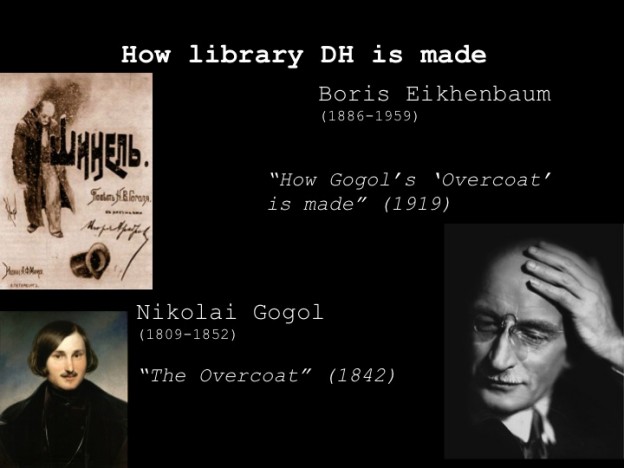The official description of today’s panel, “Literary texts and the library in the digital age,” reads as follows:
Digital technologies are opening up new possibilities for the investigation of literary and historic texts. They are also changing library spaces and reconfiguring relationships between librarians and researchers. This program investigates new roles for European and American Studies librarians in this emerging physical and virtual environment.
I’m going to try a “slow burn” approach, and not reveal the actual title of my paper just yet. Our panel today is called upon to discuss “literary texts and the library in the digital age.” I suppose it’s possible to imagine, based on this title, that the panel is not explicitly about the digital humanities; oddly enough, the widely accepted term of art “digital humanities” doesn’t appear in the panel description at all, although I’ve assumed that you’ve come to hear precisely about that, and that’s certainly what I’ve come prepared to talk about.
Does this reticence actually to name the topic come from a sort of DH fatigue? Or a DH phobia?[1] 
I sincerely hope that it’s neither fatigue nor phobia. I certainly see in our panel description all the signs of contemporary digital humanities and digital library discourse: phrases like “digital technologies” and “opening up new possibilities”; loaded terms like “changing,” “reconfiguring,” “emerging,” and “virtual” speak to a current fascination with (or, some may say, even fetishization of) the affordances of technology as they apply to literature and the library.
But I also see other words in the panel description, and these in fact please me more: “investigation,” “literary,” “historic texts,” “relationships between librarians and researchers,” “European and American Studies.” These are good, old-fashioned words about humanities research and “traditional” library work. (Some recent reading, which I’ll mention in a bit, has made me wary of that “traditional” concept, though.)
But I also see other words in the panel description, and these in fact please me more: “investigation,” “literary,” “historic texts,” “relationships between librarians and researchers,” “European and American Studies.” These are good, old-fashioned words about humanities research and “traditional” library work. (Some recent reading, which I’ll mention in a bit, has made me wary of that slippery concept of “tradition,” though.)
As I’ve thought about what I might present to an audience of librarians, I decided to go for something that had at least a chance of being new to you – something you may not have thought about, or read from the dozens of truly outstanding writers about the topic of digital humanities in the library.

